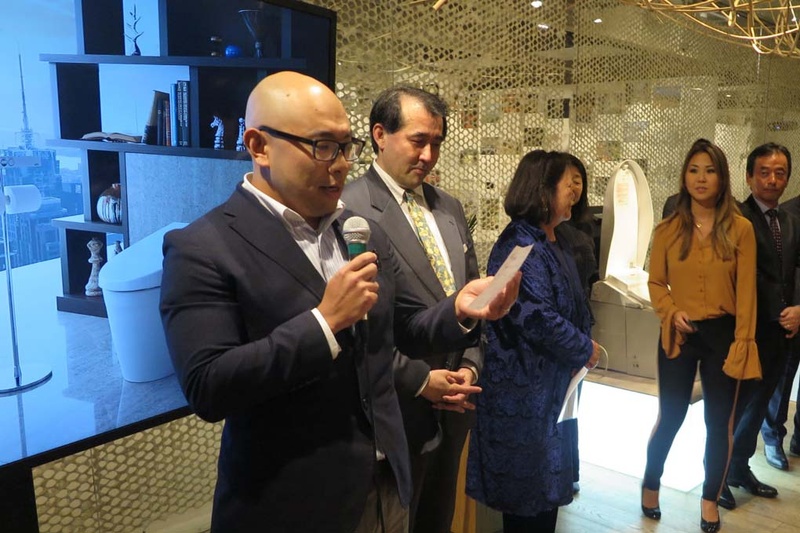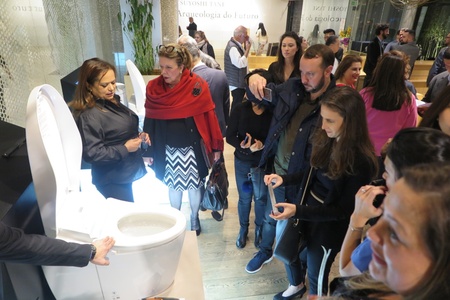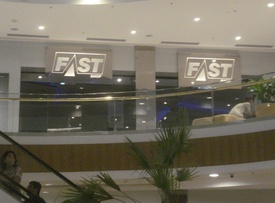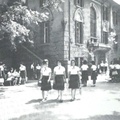"Due to security issues, please don't use my name or photograph," I was told during a conversation I had just had with the Japanese-Brazilian founder of FAST SHOP, the exclusive distributor of Toto toilet seats and Washlet products, at the launch ceremony for the company's toilet seats and Washlet products, held at the Aizome restaurant in the Japan House in Sao Paulo on the evening of August 28th.
FAST SHOP is a major home appliance retail chain with 101 stores across nine states in Brazil. They sell a wide range of products, from information appliances such as smartphones and computers to LCD TVs, washing machines, refrigerators, and cooking appliances. However, instead of the typical business model of major home appliances, which is to sell cheap and low-quality products, they only sell well-established products targeted at the middle class and above.
In fact, I am also a regular customer of this store, and I bought a Panasonic refrigerator two years ago and a Panasonic washing machine last year. Unlike other major home appliance stores, the staff do not shout at you, but keep a reasonable distance and are more likely to respond to your questions appropriately. It is a little different from other major home appliance chains, where if you research the product online beforehand, you will end up knowing more about it than the staff.
I had heard rumors that the owner of the company was of Japanese descent, but this was my first time meeting him. He was a calm and gentlemanly man, and if you were just walking down the sidewalk of Liberdade, you wouldn't realize he was anyone special.
I did an internet search and found that the fact that "Familia Kakumoto" is running the company has already been made public, so I would like to clarify the kanji characters for "Kakumoto" that I heard from the person himself. He said, "It has never appeared in the Brazilian media before." I searched but could not find anything.
Actually a Japanese-style fast shop
I was looking at an article dated March 22, 2006 on the website of the economic magazine "ISTOÉ DINHEIRO" when I came across a rare article about the inside of FAST's headquarters. The article begins with the impression the magazine's reporter had when he visited the headquarters in the Santana district of the city of São Paulo for an interview.
"When I arrived at the main FAST SHOP store in São Paulo, something small caught my eye. There were a lot of people with slant eyes (olhos puxados) (i.e. Japanese people) working there. There were so many of them that I even playfully asked the question, 'Shouldn't there be a quota for non-Japanese employees?' The high proportion of Japanese people encapsulates the business style that this chain store intends to achieve. Daily life at FAST SHOP is imbued with truly Japanese characteristics such as humility, goal-setting, patience, passion for technology and intolerant delicacy."
The company has a tradition of not disclosing the name of the president or the annual sales amount. This is possible because it is a personal company of the Kakumoto family, not a joint-stock company. Founded in 1986, the company is assisted by the two sons. The company originally started as a Yamaha dealer, so it seems that the name is taken from the "FAST" series of boats that the company sells.
The article explains the characteristics of FAST as follows: "Executives, including the company president, will spend four or five hours discussing the complaint of a single customer. Once a salesperson has been contracted, they undergo a month of training before they start working at the storefront, during which they are required to memorize all the functions of the buttons on the products they will be selling. Since they are dealing with the wealthy, who are the most demanding customers, they have to know more about the products than the customers."
TOTO, loved by famous soccer players and Brazilian singers
When we asked the president of FAST, "What do you think about starting to sell TOTO products?", he replied with unbridled joy, "It's a wonderful thing." The fact that the president himself went out of his way to attend the launch ceremony shows just how much effort he puts into it.
Two types of toilets went on sale on the 28th. The tankless "NEOREST" (approximately 25,000 real), TOTO's top-of-the-line model, and the highly efficient "CARLYLE II" toilet with an integrated tank, which is thought to be in the half-price range. Needless to say, the incredible and comfortableness of the company's invention, the Washlet (warm water cleaning toilet seat), has astonished all foreign visitors to Japan.
Ryota Tsuda, Latin America Sales Manager at TOTO USA, emphasized, "Both of these toilets utilize TOTO's cutting-edge technology in all areas, including water conservation, cleaning, stain resistance, and ease of use." On the day, a video was shown explaining that the company was founded in 1917 as Toyo Toki Co., Ltd., and has a proud 102-year history, and that the Washlet has sold a total of 40 million units worldwide.
Regular Toto toilets (without washlets) and plumbing fixtures have already been installed at the Corinthians Stadium in the Itaquera district of Sao Paulo. Toilets with washlets have also been purchased by internationally famous Brazilian soccer players and MPB singers who are also known in Japan, and they have already been installed in some five-star hotels.
Sales manager Tsuda said, "We think that people who travel to Japan and experience our toilets will decide to purchase them."
Fabio Brusino, marketing director at FAST, declared, "Our products are selected by expert product curators to ensure they are in line with the company's direction. TOTO's products are a perfect fit for that policy. They will also be available for sale in all stores and on our website."
On the day, 70 people, including architects from the design firm and special clients of FAST, were invited and listened intently to an explanation of the products.
Famous Japanese-founded businesses
When I think back to three years ago, when a Nikkei Shimbun reporter interviewed the president of Bebidas Premium, the company that produces and sells the famous beer brand "Proibida," which is a sponsor of the carnival, he also asked me not to use his name or photo. However, after that, the name of "Mr. Morizono Nelson" was made public in a Globo news article in September last year, so now it's an open secret.
Another large store founded by Japanese people is Lustres Yamamura, the largest lighting retailer in Latin America. Its huge flagship store covers an area of 3,000 square meters on Consolacion Street in the city of Sao Paulo, but when it opened in 1972 it was just an ordinary lighting store covering an area of just 20 square meters. Currently, in addition to the flagship store, there are three other stores in shopping centers.
In addition, Camikado, a chain of over 50 stores selling bedding, bathroom accessories, tableware, etc., was originally founded by the Japanese-American Kamikado family, but was acquired by the bedding and clothing chain Renner a few years ago.
From the darkness came, "Forgive me, sir!"
I was shocked on my way home from an interview with Toto. Around 9pm, as I was walking along the sidewalk on Vergueiro Street, I heard a loud voice from the darkness near the hospital entrance say, "Please forgive me, sir!" I wondered, "Why am I hearing Japanese that sounds like something out of a period drama in a place like this?" and when I looked closer, I saw that it was a beggar on the street. What's more, he was a Japanese-American man around 40 years old...
I guess the Japanese person must have taken the "husband's" sleeping place or his food. As I passed by, the "husband" looked like a bearded Brazilian man in his 60s. It's a mystery why he was apologizing in Japanese.
It was a truly strange sight. The black-Japanese man looked familiar. Retracing my memory, I realized he was a former dekasegi who often appeared on Galvao Bueno Street about 10 years ago. I had spoken to him once, and he told me that he had lost his job in Japan in the aftermath of the 2008 global financial crisis and had returned to Brazil. I remember him saying that he had worked in Soka City, Saitama Prefecture, and we had gotten excited talking about the local specialty, "Soka Senbei."
On the way home from meeting a Japanese-American who runs a famous electronics chain store in the glamorous Japan House, I saw a Japanese-American beggar begging for forgiveness in Japanese. This contrast made me feel as if I was being shown the sad reality of the enormous disparity that exists in the world's largest Japanese community.
*This article is reprinted from the Nikkei Shimbun (September 3, 2019).
© 2019 Masayuki Fukasawa / Nikkey Shimbun








